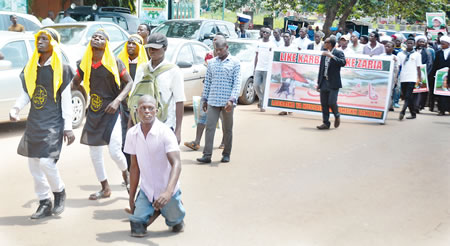
MEMBERS of the Islamic Movement in Nigeria (IMN), also known as Shiites, had a deadly encounter with security agencies last week. The confrontation which lasted for three consecutive days left in its wake deaths, blood and tears. There has been no credible official confirmation of the number of casualties but the IMN claims a frightening figure that could happen only in a full-blown war situation. Nonetheless, the encounter exposed the underbelly of the security agencies in crowd management. In modern times, particularly in liberal democracies where it is the inalienable right of citizens to embark on public processions within the ambit of the law, the competence of security agencies in crowd management is very critical.
Without mincing words, the security agents failed woefully in this regard as many deaths were recorded right from the first day of the protest. Security officials allegedly used live bullets on harmless citizens. The security agents’ show of incompetence was awful; it smacked of inadequate preparation and a lack of requisite training for the important task. We condemn the security agencies for their poor and clearly unprofessional crowd management. Worse things are known to happen in other climes but they are professionally handled and managed to obviate dire repercussions/consequences. And given the unfortunate incident of the Army-Shiite clash of December 12, 2015 in Zaria, Kaduna State, the attendant mass killing and the local and international outrage it attracted, it was expected that the security agents would have learnt some useful lessons that would have made the handling of the recent encounter more professional. But that was not the case as the security personnel still resorted to the use of disproportionate force and demonstrated an appalling level of ineptitude.
Sadly, it would appear that the security agencies have yet to shake off the colonial era mentality that protest is necessarily adversarial, a situation which tends to define the harsh treatment they often mete out to protesters. This should not be the case as the law protects any citizen who participates in a protest from harassment by security agents. Protest, which was one of the many tools deployed by the country’s early nationalists to fast-track movement to the negotiation table for the country’s independence, cannot just be wished away by the political leadership on the altar of self-preservation. It remains one of the legitimate means of expressing disapproval of official policies, decisions and actions which any group considers inimical to its interest.
The use of lethal weapons by security agencies to combat the Shiites’ protest as if the religious group was doing something unlawful is therefore wrong and condemnable. It is the duty of the security agencies to ensure public order during protests rather than adopting tactics aimed at neutralising the protesters whom they erroneously see as enemies. It is equally imperative to state that while the IMN has the right to register a protest by way of public procession, it must do so lawfully and in ways that do not infringe on other people’s rights. The leadership of IMN should warn its members to be orderly: they should not disrupt public peace and impede people’s right of movement.
Besides, the allegation that the religious sect does not recognise state authorities at any level, if established, cannot be tolerated. No group can exist outside of the extant laws of a sovereign state. Again, even though members of the IMN might have been provoked to attack the security agencies with bottle canisters, large stones and catapults and so on as claimed by the latter, the fact that the sect came prepared for such eventuality casts some doubt on the civility of its protest. The point being made is that the Shiites need not provide justification for the alleged brutality and gross incompetence of the security agencies in crowd management.
It is doubtless that the frequent protests by the IMN will reduce if the government considers the root of the problem: the illegal detention of its leader, Ibrahim El-Zakzaky. The courts have pronounced on the matter, but the government has brazenly scoffed at the rule of law. Irrespective of what classified information or intelligence report is at the disposal of the government, it should not have disobeyed the court orders on the religious leader’s release. The failure of the government to enforce the rule of law in the circumstance might have occasioned the seeming inclination towards self-help by members of the sect. The tendency towards anarchy is the usual consequence of undermining the rule of law. It is hoped, however, that government will learn to tread cautiously in its handling of the recurring Shiite crisis in order avoid its mutation into another terror group.
END

Be the first to comment